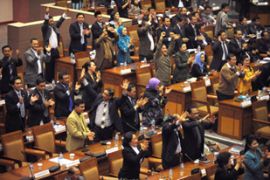Probe into Indonesia bank bailout
Indonesian parliament votes for a criminal investigation into 2008 bank bailout.

The vote was supported by 325 MPs – more than half the assembly – including members of parties tied to the ruling coalition.
The pair, considered the most respected economic figures in the cabinet of Susilo Bambang Yudhoyono, Indonesia’s president, have been under intense pressure after the country’s top auditor last year found strong indications of “violations” in the bailout.
Yudhyono has repeatedly defended the rescue of Bank Century, saying it was needed to prevent wider damage to the economy and protect Indonesia from the global financial crisis.
But the opposition has said the bailout drained money from state coffers that could have been used to boost infrastructure, while some of the money was diverted to Yudhyono’s political party.
Street protests
| In video |
|
Al Jazeera’s Step Vaessen reports on the deepening bank bailout scandal |
Despite Wednesday’s vote analysts say it is unlikely that Yudhoyono will either allow the investigation to take place or suspend the pair, even in the face of parliamentary pressure.
“The president can’t be politically forced to suspend the two figures if there’s no legal proof that they had broken laws or misused funds,” Fauzi Ichsan, an economist with Standard Chartered Bank told the AFP news agency.
“The country’s economy will suffer without them. These two reformers are highly respected by the domestic and international market.”
The parliamentary debate over the issue comes amid street protests in several Indonesian cities.
On Wednesday, demonstrators in Jakarta threw sticks at police outside parliament and students in the South Sulawesi city of Makassar damaged vehicles and blocked main roads, causing huge traffic jams.
The bank scandal has been depicted as the latest battleground in a war between Indonesian reformers and non-reformers, including some members of the ruling coalition, who are opposed to tackling corruption and overhauling the country’s civil service, police and judiciary.
It has also risked being particularly damaging for Yudhoyono, who was elected in July 2009 for a second five-year term on a campaign promise to stamp out rampant corruption.